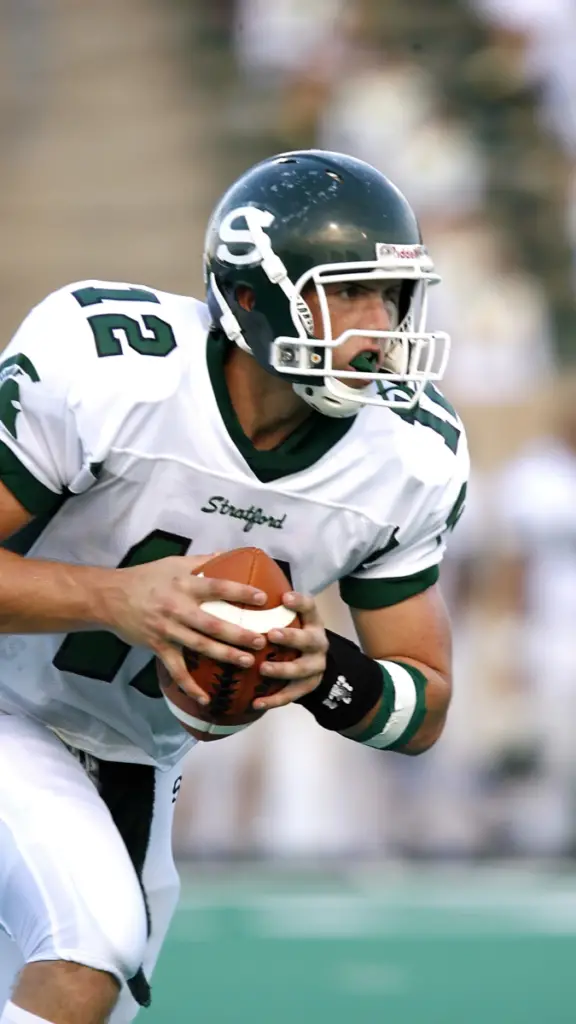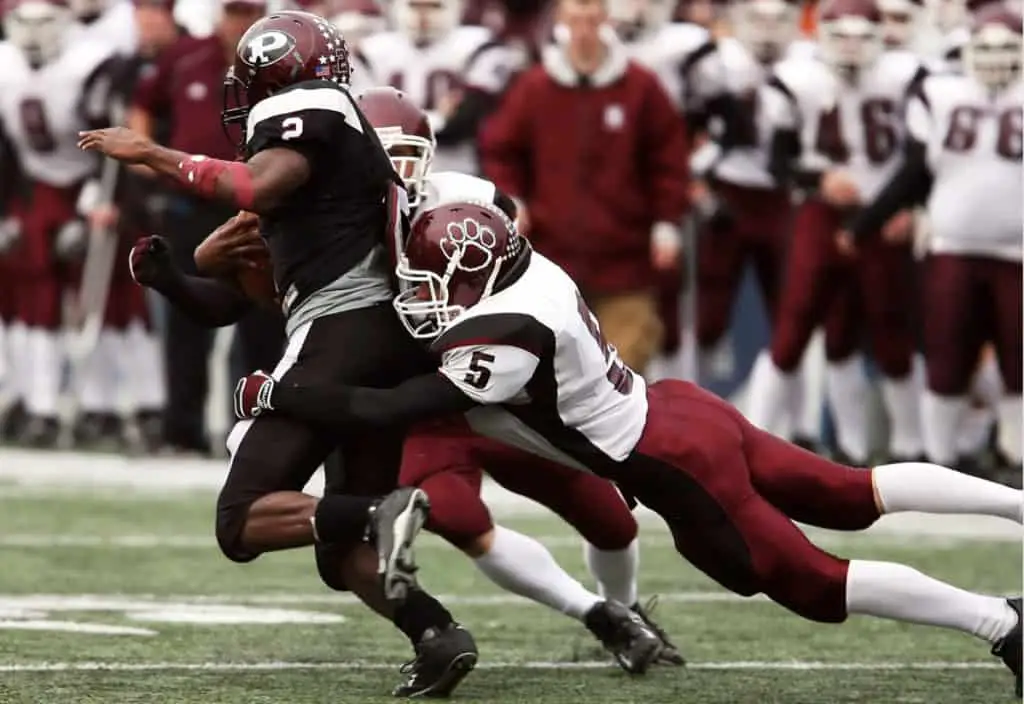Football players of all ages love the part of football that involves throwing and catching, as well as scoring touchdowns. Playing receivers allows for these to happen, but also does include many other skills necessary for success in football.
Receivers are athletic players that are involved in both the passing game and the run game. Wide receivers need a variety of skills in order to be great at what they do.

How to Play Wide Receiver
The position of wide receiver requires a multitude of skills, including speed, hand-eye coordination, blocking ability, catching ability, toughness, and football IQ.
Below we will discuss the requirements of playing wide receiver. There are many skills required and, but playing receiver can be a fun position on the football field.
Skills Needed to Play Wide Receiver: Speed
Speed is one of the most useful attributes and skills for any athlete. Football is a game of speed and strength, but speed seems to be the most important part of being a wide receiver.
Receivers use their speed as they run routes in order to catch passes. Playing receiver requires a battle between that player and the player across from the receiver, usually a player with speed as well.
Why is Speed Important for Route Running?
Defensive backs are typically very athletic players on the football field. The receiver is usually covered by a defensive back. The ability to run a precise route as quickly as possible is extremely important.
Quarterbacks are being rushed and many times have to get rid of the ball quickly and effectively. In order to help the quarterback it is important for the wide receiver to get to his landmark on the route as quickly as possible.
Many of the routes are timing routes, meaning the quarterbacks sometimes throw the pass just as the wide receiver is getting into his break. Speed allows the wide receiver to get there quickly and allows for the quarterback to have enough time to make an accurate, but on time pass.
Skills Needed to Play Wide Receiver: Hand-Eye Coordination
This is a skill that a lot of people disregard when it comes to sports. Hand-eye coordination is an extremely important attribute to have. Most sports require hand-eye coordination.
Football is a sport that for some positions, hand-eye coordination isn’t all that important, however, playing wide receiver does require a great deal of hand-eye coordination.
Wide receivers catch most of the passes thrown in a football game. In order to be successful catching a football, hand-eye coordination is crucial. Passes are thrown at varying speeds and in different locations. Having the ability to catch the football regardless of where it is thrown or how hard it is thrown is vital to having success as a wide receiver.
Many players wear eye black to help improve their vision and catching ability. Find out why players wear eye black.
Skills Needed to Play Wide Receiver: Blocking Ability
There are many people who think that playing wide receiver is as simple as catching a football and running with it. There are many more skills required than just catching the football.
Wide receivers are expected to block on the perimeter. Wide receivers who are willing to block can turn 10 yard gains into long touchdowns. Blocking as a wide receiver is crucial for success.
At the lower levels of football, many football teams run the ball more than they throw the ball. With this being the case, the necessity to block a defender is extremely important. Even at the NFL level, wide receivers must be able to block well, a skill that isn’t very easy to do in space.
Blocking for wide receivers requires balance, toughness, and great footwork. Blocking in space is more of a finesse block at times, but there is a skill involved with this, and many can not effectively block in space.
Skills Needed to Play Wide Receiver: Catching Ability
The ability to catch the football may be the most important part of playing wide receiver. For offense, the wide receiver is the most targeted player on the field in the passing game.
Hand-eye coordination, route running, and speed all play a huge role in getting open in order for the quarterback to make an effective pass. Once all of that happens, the wide receiver will then be required to make a catch, sometimes not the easiest catch either.
Catching requires focus, and good hands, often called soft hands. The ability to slow your body down, but also run at full speed and focus enough to catch a football can be a difficult skill.
Developing hand-eye coordination and dexterity at an early age is vital to success later on in football, as a wide receiver.
Skills Needed to Play Wide Receiver: Toughness
Toughness is important at any position, but as a wide receiver toughness is crucial during all blocking, as well as catching. In football, defenders are taught to make contact with the receiver as he is touching the football.
Wide receivers at a young age have a tendency to shy away from contact, but this impacts the opportunity to make a catch. Toughness includes being able to focus enough to not only catch the ball, but also take a hit from a defender, many times.
Although some may say that playing wide receiver isn’t that physical, they are wrong. The more physical a wide receiver is, the better opportunity he will have at success.
Receivers also could have difficult weather to play in. Receivers need to be comfortable and battle through tough conditions because catching the football can be difficult in cold weather. Find out how to stay warm during football competitions.
Skills Needed to Play Wide Receiver: Football IQ
This is the part of the game that has evolved over the years. Running crisp routes as a wide receiver is vital to success.
As players get older and move up the ranks in football, the wide receiver position becomes even more complicated and challenging. The mental part of the game is important and vital.
As the level of football increases, so does the schematic part of the game. Making sure that the quarterback and wide receiver are on the same page is a big art of football nowadays.
Wide receivers in the game today read defenses post-snap; meaning that they adjust routes based on how the defense reacts after the snap of the ball.
Having a high football IQ is important for wide receivers.
Next Steps: How can I Become a Better Wide Receiver?
Thinking about playing wide receiver? There are some attributes that seem necessary if you are attempting to play wide receiver. Bigger guys might have a more difficult time playing receiver, because speed is important.
Developing speed is vital and can be worked on with agility drills. Strength in the weight room, with the lower body, can help develop the speed necessary.
Catching is a vital part of playing receiver, and if you want to become better, it is recommended that you catch a football everyday. The simple activity of throwing and catching, especially at young ages, can help develop affecting catching skills and soft hands.
Remember also, being physical is important, because wide receiver are required to block defenders. This can be improved in the weight room, by increasing strength and confidence.

Who are Some of the Best Receivers to Ever Play in the NFL?
- Jerry Rice
- Randy Moss
- Lance Alworth
- Steve Largent
- Terrell Owens
- Larry Fitzgerald
- Calvin Jonson
All of these receivers had the skills necessary to be successful. These players worked hard at getting stronger, developing speed, hand-eye coordination, and toughness. The football IQ’s of these players were above many of the players during their time.
Other Helpful resources:
